book4 unit2说课稿
《新视野英语教程(第三版)》教学资源book4Unit2-Section A

the text.
Where is the author in the winter of 1942? And with whom? Why does he sink deeper and deeper into despair? What does the author mean by saying “Don’t bring me an apple tomorrow? What does this apple mean to the author? What has the author lost during the war, and what does he still have? What is the author still hungry for?
《新视野英语教程(第三版)》教学资源book4Unit2-Section B

Para. 6-7
I remember I complained about the truck, but I don't remember you ever complaining when you came home tired from work and I asked you for money to go on the road again. If you did complain, I guess I didn't hear you. I was too wrapped up in my problems to think of yours.
Para. 2-3
My Darling Wife, This is a letter that no man ever wants to write, but
I'm lucky enough to have some time to say what I've forgotten to say so many t do we know about the driver’s life? She’s a beautiful, diligent and tender-hearted woman.
Intensive Reading
Para. 1
In the northern Canadian mountains, one driver was found dead in his truck after a bad snowstorm. He perhaps lived for a couple of hours until the cold got him. He had written his last letter to his wife.
Outside_view 视听说 Book 4 Unit 2 A Good Read 教学课件

Outside view
5 Work in pairs and discuss the questions.
Q1. What do you think the British Library is?
Q2. What do you think you can find there?
Q3. How many items do you think it adds to its collection every year?
Outside view
2 Watch Part 1 of the video clip and check (✓) the information mentioned.
The statements mentioned are: 2 and 7. Now work in pairs and decide what the most surprising piece of information is.
新视野英语教程教案book4Unit2
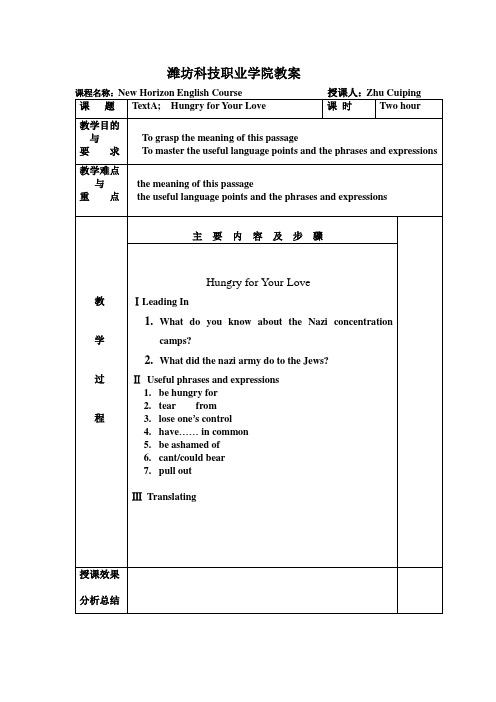
潍坊科技职业学院教案Text A Hungry for Your LoveI Detailed Study of the TextA1. I am almost dead, surviving from day to day, from hour to hour, ever since I was taken from my home and brought here with tens of thousands of other Jews.from day to day: day by day; as time goes on 一天天地;日益地The symptoms changed from day to day.症状一天天在发生变化。
The problem is getting worse from day to day.这个问题变得一天比一天糟。
from hour to hour: (of something) changing very quickly and very often (变化)快速不断地;每小时都有地The weather conditions in these mountains change from hour to hour.山间的天气情况时时在变。
2. I want to look away, oddly ashamed for this stranger to see me like this but I cannot tear my eyes from hers.Meaning:The girl, who is a stranger, looks at me like this, which shames me in a strange way. But I cannot move my eyes away from hers; I just cannot stop looking at her.oddly:adv. in a strange or peculiar manner 奇怪地;古怪地Mary looked at Tom very oddly.玛丽怪模怪样地看着汤姆。
高中英语必修四-unit2课文详解book4-unit2
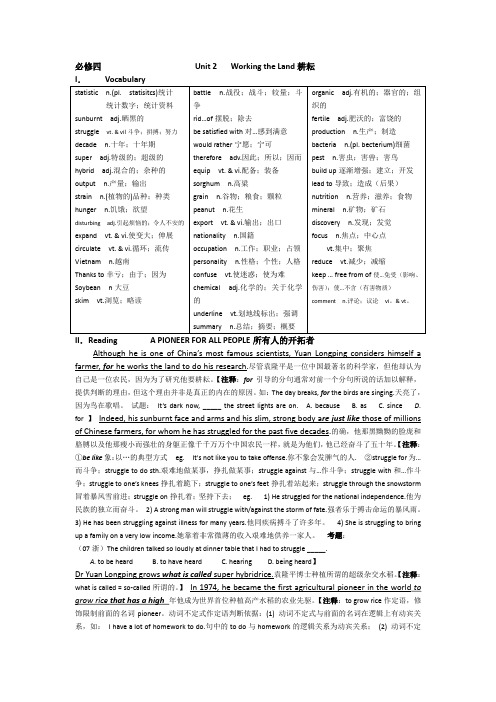
必修四Unit 2 Working the Land耕耘II.Reading A PIONEER FOR ALL PEOPLE所有人的开拓者Although he is one of China’s most famous scientists, Yuan Longping considers himself a farmer, for he works the land to do his research.尽管袁隆平是一位中国最著名的科学家,但他却认为自己是一位农民,因为为了研究他要耕耘。
【注释:for引导的分句通常对前一个分句所说的话加以解释,提供判断的理由,但这个理由并非是真正的内在的原因。
如:The day breaks, for the birds are singing.天亮了,因为鸟在歌唱。
试题:It’s dark now, _____ the street lights are on. A. because B. as C. since D. for 】Indeed, his sunburnt face and arms and his slim, strong body a re just like those of millions of Chinese farmers, for whom he has struggled for the past five decades.的确,他那黑黝黝的脸庞和胳膊以及他那瘦小而强壮的身躯正像千千万万个中国农民一样,就是为他们,他已经奋斗了五十年。
【注释:①be like象:以…的典型方式eg. It's not like you to take offense.你不象会发脾气的人. ②struggle for为…而斗争;struggle to do sth.艰难地做某事,挣扎做某事;struggle against与…作斗争;struggle with和…作斗争;struggle to on e’s knees挣扎着跪下;struggle to one’s feet挣扎着站起来;struggle through the snowstorm 冒着暴风雪前进;struggle on挣扎着;坚持下去;eg. 1) He struggled for the national independence.他为民族的独立而奋斗。
新标准大学英语BOOK4-unit2教案-李骠
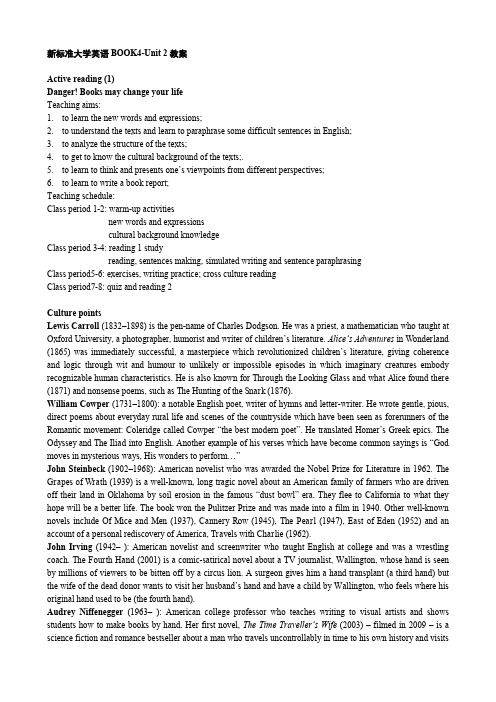
新标准大学英语BOOK4-Unit 2教案Active reading (1)Danger! Books may change your lifeTeaching aims:1.to learn the new words and expressions;2.to understand the texts and learn to paraphrase some difficult sentences in English;3.to analyze the structure of the texts;4.to get to know the cultural background of the texts;.5.to learn to think and presents one’s viewpoints from different perspectives;6.to learn to write a book report;Teaching schedule:Class period 1-2: warm-up activitiesnew words and expressionscultural background knowledgeClass period 3-4: reading 1 studyreading, sentences making, simulated writing and sentence paraphrasingClass period5-6: exercises, writing practice; cross culture readingClass period7-8: quiz and reading 2Culture pointsLewis Carroll (1832–1898) is the pen-name of Charles Dodgson. He was a priest, a mathematician who taught at Oxford University, a photographer, humorist and writer of children’s literature. Alice’s Adventures in Wonderland (1865) was immediately successful, a masterpiece which revolutionized children’s literature,giving coherence and logic through wit and humour to unlikely or impossible episodes in which imaginary creatures embody recognizable human characteristics. He is also known for Through the Looking Glass and what Alice found there (1871) and nonsense poems, such as The Hunting of the Snark (1876).William Cowper (1731–1800): a notable English poet, writer of hymns and letter-writer. He wrote gentle, pious, direct poems about everyday rural life and scenes of the countryside which have been seen as forerunners of the Romantic movement: Coleridge called Cowper “the best modern poet”. He translated Homer’s Greek epics. The Odyssey and The Iliad into English. Another example of his verses which have become common sayings is “God moves in mysterious ways, His wonders to perform…”John Steinbeck (1902–1968): American novelist who was awarded the Nobel Prize for Literature in 1962. The Grapes of Wrath (1939) is a well-known, long tragic novel about an American family of farmers who are driven off their land in Oklahoma by soil erosion in the famous “dust bowl” era. They flee to California to what they hope will be a better life. The book won the Pulitzer Prize and was made into a film in 1940. Other well-known novels include Of Mice and Men (1937), Cannery Row (1945), The Pearl (1947), East of Eden(1952) and an account of a personal rediscovery of America, Travels with Charlie (1962).John Irving (1942–): American novelist and screenwriter who taught English at college and was a wrestling coach. The Fourth Hand (2001) is a comic-satirical novel about a TV journalist, Wallington, whose hand is seen by millions of viewers to be bitten off by a circus lion. A surgeon gives him a hand transplant (a third hand) but the wife of the dead donor wants to visit her husband’s hand and have a child by Wallington, who feels where his original hand used to be (the fourth hand).Audrey Niffenegger (1963–): American college professor who teaches writing to visual artists and shows students how to make books by hand. Her first novel, The Time Traveller’s Wife (2003) – filmed in 2009 – is a science fiction and romance bestseller about a man who travels uncontrollably in time to his own history and visitshis wife in her childhood, youth and old age. His wife needs to cope with his absences and dangerous life while he travels. The story is a metaphor for distance and miscommunication in failed relationships.Paul Torday (1946– ): a British busines sman who worked for a company that repaired ship’s engines for many years. Salmon Fishing in the Yemen (2007) was his first novel. It is a political satire and comedy about a dull civil servant who becomes involved in a plan to populate the desert with Scottish salmon. Politicians manage the media to “spin” this as a plan they support in order to divert attention from problems in the Middle East. There are themes of cynicism and belief, and East-West culture clashes.Aleksandr Solzhenitsyn (1918–2008): a Russian writer who was imprisoned in Soviet labour camps in 1945; after eight years, he was exiled to Kazakhstan and not freed until 1956, when he became a teacher. In 1970 he was awarded the Nobel Prize for Literature but not receive it until 1974. He went to Germany, Switzerland and the USA, returning to Russia in 1994. His best known novels were based on his experiences as a prisoner and include: One Day in the Life of Ivan Denisovich (1962), Cancer Ward (1968), The Gulag Archipelago (1974–1978). His later works were about Russian history and identity.Graham Greene (1904–1991): a British novelist, short-story writer, playwright, travel writer and essayist. He wrote a number of thrillers (he called them ‘entertainments’) which dramatize an ambiguous moral dilemma, often revealing guilt, treachery, failure and a theme of pursuit. Greene was also a film critic and all of these novels have been made into films: Brighton Rock (1938), The Power and the Glory (1940), The Heart of the Matter (1948), The Third Man (1950), The Quiet American (1955), and Our Man in Havana (1958).E. M. Forster (1879–1970): a British novelist and writer of short stories and essays. He lived at different periods in Italy, Egypt and India and taught at Cambridge University. His best known novels include A Room with a View (1908), Howard’s End (1910), A Passage to India (1924) which have all been made into films. His writing about reading and writing includes a book of lectures, Aspects of the Novel (1927).Thomas Merton (1915–1968): an American Catholic writer, who was a Trappist monk in Kentucky. He wrote over 70 books, including many essays about Buddhism and a translation into English of the Chinese classic, Chuang Tse. He had a great deal to say about the meeting of Eastern and Western cultures and wrote many letters to writers, poets, scholars and thinkers. He read a lot in English, Latin, French and Spanish and said he always had at least three books which he was reading at any one time.William Blake (1757–1827): a British poet, artist and mystic, who read widely in English, French, Italian, Latin, Greek and Hebrew. He made many engravings to illustrate the work of such writers as Virgil, Dante and Chaucer, as well as his own poems. He stressed that imagination was more important than rationalism and the materialism of the 18th century and criticized the effects of the industrial revolution in England, but his work was largely disregarded by his peers. He is best known for his poetry in Songs of Innocence (1787) and Songs of Experience (1794). His belief in the oneness of all created things is shown in his much-quoted verse, “To see the world in a grain of sand / And a heaven in a flower, / Hold infinity in the palm of your hand / And eternity in an hour.”Clifton Fadiman (1904–1999): an American writer, radio and TV broadcaster and editor of anthologies. For over 50 years he was an editor and judge for the Book-of-the-Month Club. In 1960 he wrote a popular guide to great books for American readers, The Lifetime Reading Plan, which discusses 133 authors and their major work: the 1997 edition includes 9 authors from China.J. K. Rowling (1965–): British writer of the seven Harry Potter fantasy books. She studied French and Classics at Exeter University, before teaching English in Portugal and training to teach French in Scotland. The main idea about a school for wizards and the orphan Harry Potter came on a delayed train journey from Manchester to London in 1990. She began to write as soon as she reached London. Twelve publishersrejected the first book before Bloomsbury, a small London publisher, agreed to publish it. Later books have repeatedly broken all the sales records (as have some of the films). She is one of the richest women in the UK and a notable supporter of many charities.Language points1 Variety’s the very spice of life, / That gives it all its flavour … (Para 2)Spices are made from plants and added to food to give it its particular flavour or taste. The English proverb “Variety is the spice of life” (the proverb comes from Cowper’s poem) therefore means that variety gives life extra value and allows you to appreciate life in particular ways.2 We learn to look beyond our immediate surroundings to the horizon and a landscape far away from home. (Para 3)This means that through reading we learn to look beyond our immediate experience or familiar environment to things beyond our immediate experience, ie to completely different things that we can imagine and experience through books.3 When a baseball player hits a home run he hits the ball so hard and so far he’s able to run round thefour bases of the diamond, and score points not only for himself but for the other runners alreadyon a base. (Para 9)In the American game of baseball, the field of grass is diamond-shaped and has four bases (specific points marked around the diamond), round which players must run to score points. One team bats (ie team members take turns to hit the ball and run round the bases) and the members of the other team throw (pitch) the ball and, when it is has been hit, try to catch it or get it quickly to one of the four bases. If a batting player can hit the ball hard enough, he can run round all four bases before the other team can get the ball and thus score maximum points – with a home run. In the passage, a really good book is a home run.3 Choose the best answer to the questions.1 Why are we like Alice in wonderland when we read a book?(a) Because, like Alice, we often have accidents.(b) Because reading makes us feel young again.(c) Because reading opens the door to new experiences.(d) Because books lead us into a dream world.2 According to the writer, what is the advantage of reading over real life?(a) There is more variety in books than in real life.(b) We can experience variety and difference without going out of the house.(c) The people we meet in a book are more interesting than real people.(d) It’s harder to make sense of real life than a book.3 What do the seven novels listed in Paragraph4 have in common?(a) Their titles stimulate imagination.(b) They represent the best writing by British and American novelists.(c) They have become classics.(d) You can find all of them in any local library.4 At what moment in our lives do books become important?(a) As soon as we start reading.(b) When we start buying books to fill our shelves at home.(c) When we start listening to bedtime stories.(d) Only when we are ready for books.5 What claim did Merton make about the poems of William Blake?(a) They were similar to the works of the Greek writers and thinkers.(b) They helped him understand the meaning of life.(c) They created a sense of confusion.(d) They taught him a lot about modern culture.6 What is meant by a home-run book?(a) A book which is so good you are unable to put it down.(b) A book that the whole family can enjoy.(c) A children’s book that is read and appreciated by adults.(d) A book that hits hard like a home run in the game of baseball.Dealing with unfamiliar words4 Match the words in the box with their definitions.1 to make someone feel that they do not belong to your group (exclude)2 to fail to do something that you should do (neglect)3 to mention something as an example (cite)4 to be strong enough not to be harmed or destroyed by something (withstand)5 in most situations or cases (normally)6 to be about to happen in the future (await)5 Complete the paragraph with the correct form of the words in Activity 4.When I lived in Britain, one of my favourite radio programmes was ca lled “Desert Island Discs”. The format was always the same: Guest celebrities were asked to imagine they had been washed ashore on a desert island, and had to choose nine books – (1) excluding the Bible and Shakespeare, which they were already provided with – to take with them to the island, to help them (2) withstand the physical and mental isolation. I sometimes like to think which books I would take. (3) Normally, like most people, I don’t have much time for reading, and I could (4) cite dozens of books which I have never read but which I w ould like to. It’s an opportunity I have (5) awaited all my life, in fact. But what would I choose? Mostly novels, probably, but I wouldn’t (6) neglect to include a volume or two of poetry. My first choice, I think, would be Tolstoy’s War and Peace. I’ve never read it, but I’m ready to believe that it is one of the most marvelous books ever written.6 Replace the underlined words with the correct form of the words in the box.1 In a good novel, the writer and reader communicate with each other. (interact)2 I have to face up to the problem sooner or later. (confront)3 I read the book in one sitting and Mary did too. (likewise)4 E. M. Forster was one of the most important and respected British novelists of the 20th century. (influential)5 Do you believe that a work of literature can actually lead to social changes? (induce)6 Robert Burns was a great poet who wrote in the language variety spoken in Scotland. (dialect)7 The Time Traveller’s Wife is the story of a man who has a strange and inexplicable genetic disorder. (mysterious)7 Answer the questions about the words.1 If you have had a disconcerting experience, do you feel a bit (a) tired, or (b) confused?2 If you have a vista of something, can you (a) see or imagine it, or (b) go and visit it?3 Would you express great wrath by (a) smiling at someone, or (b) shouting at them?4 If you feel enchanted by a book, do you (a) like it a lot, or (b) not like it at all?5 Is a writer who is supremely talented (a) very good, or (b) quite good at his job?6 If reading fosters an understanding of certain problems, does it (a) help understanding, or (b) prevent it?7 If you are desperately trying to get a job, are you (a) trying very hard to get it, or (b) caring littlewhether you get it or not?8 Is a sensation (a) a certainty, or (b) just a feeling?Reading and interpreting8 Check () the writer’s main purpose in writing the passage.1 To show the reader how to read fiction.2 To suggest that fiction is more powerful than non-fiction.√ 3 To persuade the reader that reading can be a life-changing experience.4 To claim that books provide the meaning to life.5 To recommend some major novels to read.9 Work in pairs. Look at the statements from the passage and discuss the questions.1 … when we pick up a book we are about to enter a new world.Do you agree with this statement? Is this true of every book?I agree with this up to a point, but it is not true of every book because with some books you may already be very familiar with the world of those particular books so although you might read them, they wouldn’t take you to a new world.2 We’ll have experiences which are new, sometimes disconcerting, ma ybe deeply attractive, possibly unpleasant or painful, but never less than liberating from the real world we come from. How can reading be a “painful” experience? In what sense does reading “liberate” us from the real world?It is easy to imagine how reading could be a painful experience for some people: It depends on the book and on the reader’s background and personal ity. For instance, I can see that a story about bullying, might be painful to read if you were bullied when you were a child – it would remind you of the experience of being hurt.Reading can liberate us because in books we can have all sorts of wonderful and interesting experiences which would be impossible for us in the real world: we can travel to distant places or go anywhere in time, we can meet all sorts of people we probably wouldn’t meet anywhere else except in books.3 Reading books allows us to enjoy and celebrate this variety and difference in safety, and provides us with an opportunity to grow.How does this idea contrast with the title of the passage? In what way can a book help us “grow”? The word “Danger” in the title contrasts with this idea that reading is a safe experience. However, this is not a contradiction because experiences that would be dangerous in real life are quite safe when we read about them in books. The author seems to think that we grow in our minds with a better understanding and enriched imagination when we meet a wide variety of people and different situations in books. This vicarious experience in reading is a safe way to grow mentally and emotionally.4 To interact with other people’s lives in the peace and quiet of our homes is a privilege which only reading fiction can afford us.Do you agree? Is fiction really different from other types of writing?Well, I think this is true because in fiction we do interact with the characters, both positively (with characters we can identify with) and negatively (with characters we do not like or admire). But this doesn’t mean that we don’t interact with the writer in non-fiction. Surely all of us have the experience of feeling that we do interact with writers in newspaper or magazine articles and in some kinds of non-fiction which may be about science, for example. I suppose it depends on the style of the writing and on the personality of the writer (and of characters in fiction) and on us, as readers.5 We even understand … that we h ave more in common with other readers of books in other cultures than we might do with the first person we meet when we step out of our front doors.This suggests that people who read are different from people who don’t read. Do you agree? Well, I am not sure. I guess that people who read similar books, fiction or non-fiction, would share some common knowledge, experience and maybe feelings and they would probably talk about these when they know about each other’s reading habits. Of course, they wouldn’t ne cessarily have other things in common, just this particular connection with a certain kind of culture through reading. Maybe people in the street do not have to share this reading experience, so in that respect they are different, but they may be quite similar and share many cultural experiences in other ways –after all they live in the same place, probably speak the same language. So, I think it’s all a question of what sort of common experiences you are talking about. The more I think about it, the less I agree!6 From the bedtime story read by a parent to their child all the way through to the sitting room lined with booksin our adult homes, books define our lives.What do you understand by “books define our lives”?I suppose they would be those books – not many, surely? – which have made a great impact and remain so strong in our memories that do have a function of defining something in our lives. However, I think the author has exaggerated here. Books are not the only things that define our lives. People, places and special events define our lives too, so books are only one part which for some people have a great influence but for others maybe very little or none at all. We have to remember that some people simply don’t read books. Even some students on ly read what they have to read, nothing more than that!7 We cannot withstand the hunger to visit another world, to meet different people, to live other lives and to reflect on ourselves.Do you agree that we “live other lives” when reading? Or is this an exaggeration?I agree that we have strong imaginative experiences when we read. Maybe you can call this “living other lives” sometimes, but for me, anyway, this simply doesn’t happen very often and when it does happen it is only for a short time. I think the writer is exaggerating here to make the point that reading has importance in our imagination.8 Books may change your life.Is this a suitable title – and ending – for the passage? Why / Why not?Yes, I think it OK as a catchy title – it gets our attention, after all, and repeating it at the end makes a kind of coda like the ending of a piece of music which echoes something near the beginning. Also if you look carefully, it does have a note of caution by using “maybe” instead of “will”, so this title isn’t a definite promise, it’s more of an attractive idea, that your life may be changed through books, but might not be.Now discuss which of the above statements would have been more effective if backed up byexample(s).In fact, it seems that any of them could effectively be illustrated by examples, but if all of them were to be backed up with examples, the whole passage would be a lot longer and maybe too heavy with examples.If I had to choose just two statements which need supporting examples, I would say numbers three and six because I’d say the ideas about ‘growing’ through books and books ‘defining’ our lives are too vague without examples.Active reading (2)They were alive and they spoke to meBackground informationThis is from The Books in My Life by Henry Miller (1861–1980), an American novelist, writer and painter. Miller was born in New York, lived in Paris 1930–1939, and then in California. His best-known works blend fiction, autobiography, social criticism and mysticism: Tropic of Cancer (1934 published in France) describes his life and loves in Paris and because of its sexual frankness it was not published in the USA till 1961; Black Spring (1936) has ten autobiographical stories; Tropic of Capricorn (1939) is about his years with the Western Union Telegraph Company; The Colossus of Maroussi (1941), considered by some critics to be his best work, is a travel book about people from his stay in Greece.In The Books in My Life (1969) Miller looks at 100 books that influenced him. His list includes children’s books written originally for adults (eg Alice in Wonderland, The Arabian Nights, Greek Myths and Legends, Robinson Crusoe, The Three Musketeers); many French novels and poetry (eg by Balzac, Hugo, Giono, Nerval, Proust, Rimbaud, Huysmans, Maeterlinck), German novels (by Mann, Hesse, Dreiser) and the Chinese Lao Tse and Fenollosa’s The Chinese Written Character as a Medium for Poetry, besides work by American writers (Twain, Emerson, Thoreau, Whitman), Dostoievshy, Nietzsche, Joyce and writers on spiritual topics.Culture pointsAugust Strindberg (1849–1912): A Swedish playwright and a prolific writer of novels, short stories, satires, essays and poems, and a photographer, who tried various jobs before becoming assistant librarian at the Royal Library in Stockholm and established an experimental theatre. He is best known for his plays, including The Father (1887) and Miss Julie (1888), and for his vitality, vigour, and brilliant use of language. Miller cites Strindberg’s autobiographies, The Confession of a Fool (vol.2), a passionate love story and account of problems in his marriage, and The Inferno (vol.3), a study of his religious conversion, delusions and neuroses which reflect Strindberg’s periods of mental instability.Blaise Cendrars (1887–1961) is the pen name of Frédéric Sauser, a Swiss-born French novelist, shortstory writer, poet, and film-maker, who led a life of constant travel (he was born in an Italian railway train) doing various jobs in Russia, Europe, North and South America and Asia – he is said to have shoveled coal on steam trains in China. He lost his right arm fighting for France in World War I. His prose includes vivid, witty, action-packed novels, like Moravagine (1926), which describe travel and adventure, or works directly inspired by his own experience, like The Astonished Man (1945) and The Cut Hand (1946), and four volumes of memoirs. Miller admired his work and lists ‘virtually the complete works’ of Cendrars as influential reading.Rémy de Gourmont (1858–1915): a French writer of 50 books: essays, novels and poetry, with a strong interest in medieval Latin literature; as a critic he was admired by T. S. Eliot. He was a librarian at the National Library in Paris; later, a painful skin disease kept him largely at home. He was influential in the symbolist movement in literature. He claimed that a work of art exists only through the emotion it gives us. He asserted the need to get away from the unquestioning acceptance of commonplace ideas and associations of ideas, and believed it was necessary for thought to proceed by imagery rather than by ideas.Julius Caesar (110 BC–44 BC): a Roman statesman, known as a great military strategist. As a general he was famous for the conquest of Gaul (modern France and Belgium) which he added to the Roman Empire. He also made two expeditions to Britain, was governor of Spain and traveled in North Africa and Egypt. He was a good speaker and he wrote several books of commentaries and memoirs on Roman wars and military campaigns. Caesar’s writin g is often studied today by those who learn Latin.The Julius Caesar of literature: this phrase compares Cendrars with Caesar: both were men of action, travelers, adventurers, explorers, who somehow found time to read a lot and write books.Language points1 The fact, however, that in the past I did most of my work without the aid of library I look upon asan advantage rather than a disadvantage. (Para 1)This is irony. Miller is writing about the importance of reading and about key books in his life, but there is a paradox: Only recently has he been able to get all the books he has wanted all his life (ie he now has money, as a best-selling writer, to buy books) and, as a writer, he wrote books without the help of a library. He says that not having books wa s an advantage. The explanation is probably that Miller’s early writing was a mixture of autobiography and fiction, so he didn’t need to read other books or refer to them to do his own writing. The irony is that he is saying this in a book about the books the influenced him.2 A good book lives through the passionate recommendation of one reader to another. (Para 3)Miller thinks that a good part of the ‘life’ of a book is how one reader recommends it to another with enthusiasm, ie books are about sharing e xperience, not just the author’s experience in the book and the reader’s experience of reading it, but also the experience of word-of-mouth or face-to-face recommendation by other readers.3 And the better the man the more easily will he part with his most cherished possessions. (Para 4)This continues Miller’s thought that books are for sharing. A good person will share things he or she loves. In this case, such a person will give or lend favourite books and such generosity makes friends: When you give books you get friendship.4 If you are honest with yourself you will discover that your stature has increased from the mereeffort of resisting your impulse. (Para 6)Miller’s argument here is that you should not read everything, but that you should choose ve ry carefully and selectively. This means you should resist the temptation to read some things which are not really going to add to your knowledge or enjoyment (not every book will do this, only some). Here, he says that in this way, we grow (we “increase our stature”). That is, we grow by not reading many books. The implication is that if we choose the very best books and read these few really carefully we will get the best from them – and grow by such selection. Miller discusses 100 books which he things are such books.5 All on the side, as it were. (Para 7)Cendrars was a man of action who spent most of his time on travels and adventures. Surprisingly (you would think he did not have time), he read a lot in different languages and even wrote many books – this was in addition to his main activities.6 For, if he is anything, Cendrars, he is a man of action, an adventurer and explorer, a man who has known how to “waste” his time royally. (Para 7)Cendrars had a huge reputation as a man of action, travelling, having adventures and exploring different countries and yet he read a lot (he knew how to use the little time available to read). “Waste” is in quotes to show irony (reading isn’t a waste of time), that he reads in a royal manner (ie very thoroughly). The sentence structure here is quite French with the repetition of “he”.Reading and understanding2 Choose the best answer to the questions.1 What does Miller consider to have been an advantage during his writing career?(a) To have been able to read all the books he wanted.(b) To have grown up in a room full of books.(c) To have written without the aid of a library.(d) The fact that he never wanted to own any books.2 What did three stars on a book mean in the public library in Miller’s youth?(a) Young people weren’t allowed to read them.(b) They were the most popular books in the library.(c) They were intended for children.(d) They were more exciting than one-star books.3 Why does Miller hope the star system still exists in public libraries?(a) It is an efficient system which works well.(b) It discourages people from reading inappropriate books.(c) It makes people interested in reading.(d) It makes it easier for people to recognize books.4 Why do people lend books, in Miller’s opinion?(a) Because they feel the need to share their feelings.(b) It’s the best way to make a friend.(c) It’s less risky than lending money.(d) Because it’s not possible to possess a book for ever.5 According to Miller, what should you do when you find a book you want to read?(a) Pick it up and start reading.(b) Ask a friend for advice about the book.(c) Think about whether you really need to read it.(d) Only read it if it is original.6 What does Miller especially admire about Blaise Cendrars?(a) He had a very adventurous life.(b) He was a great writer.。
四年级上册英语说课稿-Module 4 Unit 2 How much is it? 外研社(三起)

四年级上册英语说课稿-Module 4 Unit 2 How much is it?一、教学目标1. 知识目标1.掌握购物时常见商品的英文单词及价格表达方式。
2.学会用英语进行购物对话,能够询问和回答价格。
3.通过本单元学习,提高学生的口语交流能力。
2. 能力目标1.培养学生独立思考、交际能力和语言表达能力。
2.开拓学生视野,增强学生跨文化交流能力。
3. 情感目标1.帮助学生感受到语言学习的乐趣。
2.增强学生对价值观的认知和理解。
二、教学重难点1. 教学重点1.能够正确使用购物时常见商品的英文单词。
2.掌握价格表达方式。
3.能够用英语进行购物对话。
2. 教学难点1.掌握不同货币的英文表达方式,学会汇率换算。
2.能够正确使用数量词和价格词汇。
三、教学过程1. 导入1.通过引入学生经常接触到的物品,帮助学生理解英文单词和价格表达方式。
例如:水果、蔬菜、玩具等。
2.英文板书商品单词并教授价格表达方式。
2. 提供语言1.通过词汇、图片、场景模拟等方式,引导学生学习商品单词及价格表达方式。
2.教授“are you kidding me?”等常用短语。
3. 情景模拟1.让学生分组进行商店角色扮演,练习购物对话,巩固所学的语言知识。
2.教师通过提问和评价学生的表现,引导学生不断完善对话技能。
4. 作业布置1.布置阅读练习,让学生通过阅读理解提高英文阅读能力。
2.如有时间,可指派学生制作海报或小册子,介绍他们喜欢的商品,并分享价格表达方式。
四、教学评估1. 检查1.对学生进行课堂测验,检验学生是否掌握了所学知识。
2.对学生进行口头评估,询问学生对话是否流利,是否使用了所学知识。
2. 评价1.对学生的表现进行评价,根据表现给出鼓励和建议。
2.向学生介绍不同国家的货币和汇率概念,培养跨文化交流能力。
五、教学反思本单元注重提高学生口语交流能力,通过模拟场景,帮助学生提高英文表达能力。
同时,通过学习货币汇率和不同文化对价值观的影响,培养学生跨文化交流能力。
新视野读写Book 4 Unit 2教案
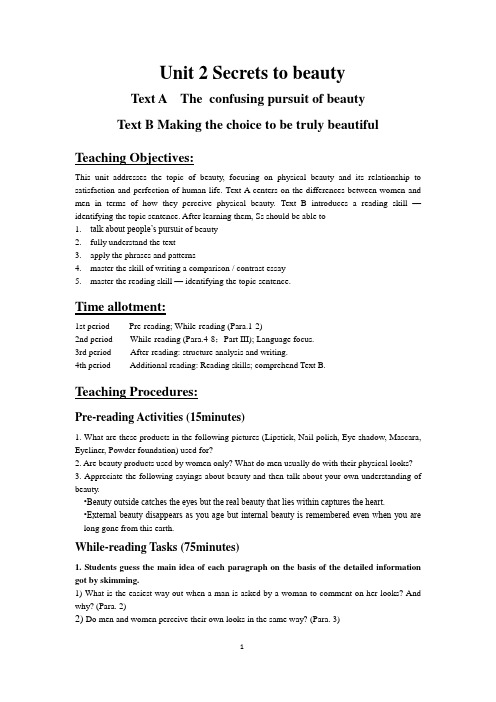
Unit 2 Secrets to beautyText A The confusing pursuit of beautyText B Making the choice to be truly beautifulTeaching Objectives:This unit addresses the topic of beauty, focusing on physical beauty and its relationship to satisfaction and perfection of human life. Text A centers on the differences between women and men in terms of how they perceive physical beauty. Text B introduces a reading skill —identifying the topic sentence. After learning them, Ss should be able to1. talk about people’s pursu it of beauty2. fully understand the text3. apply the phrases and patterns4. master the skill of writing a comparison / contrast essay5. master the reading skill — identifying the topic sentence.Time allotment:1st period------ Pre-reading; While-reading (Para.1-2)2nd period------While-reading (Para.4-8;Part III); Language focus.3rd period------ After-reading: structure analysis and writing.4th period------ Additional reading: Reading skills; comprehend Text B.Teaching Procedures:Pre-reading Activities (15minutes)1. What are these products in the following pictures (Lipstick, Nail polish, Eye shadow, Mascara, Eyeliner, Powder foundation) used for?2. Are beauty products used by women only? What do men usually do with their physical looks?3. Appreciate the following sayings about beauty and then talk about your own understanding of beauty.•Beauty outside catches the eyes but the real beauty that lies within captures the heart. •External beauty disappears as you age but internal beauty is remembered even when you are long gone from this earth.While-reading Tasks (75minutes)1. Students guess the main idea of each paragraph on the basis of the detailed information got by skimming.1) What is the easiest way out when a man is asked by a woman to comment on her looks? And why? (Para. 2)2) Do men and women perceive their own looks in the same way? (Para. 3)3)Why do men and women view their looks so differently? (Para. 6)4)What are the differences between men and women in care for details in women’s appearance? (Paras. 9-10)5)What conclusion does the author draw after contrasting men and women on different points ? (Para. 11)2. Detailed study of the text.●Detailed learning of key vocabulary and useful patterns1) affix value to 认为…有价值如果你真正想要吸引顾客,你就必须十分重视自己店里所卖产品的质量。
《新视野英语教程(第三版)》教学资源book4Unit2-Section A

triumph quickly throws the apple over the fence. I run to pick it
up, holding it in my frozen fingers. In my world of death this
2014年袁隆平Book4-Unit-2-readingPPT演示课件

2002年,她去了上海,在那里她赚了一大笔钱。 In 2002, she went to Shanghai, where she made a lot of money.
•24
评价:
她人很好,我们一直相处得很好。 She is so kind that we get along well with each other.
Strategies: Tips for summing up the main
idea of a narration
Who? What does he do? What’s the result?
•6
Who?
Yuan Longping.
What does he do? He made a great contribution to increasing rice harvest without expanding the area of the field.
•25
按照下面写作要求写一篇介绍李华的短文。 写作要求: (1) 介绍必须包括所有内容要点,但不要逐条译
成英语; (2) 词数100左右。
评分标准: 句子结构的准确性,信息内容的完 整性。
•26
• 1993年5月,李华出生于广东省海丰县。
2. 于2000-2006年就读于海城小学,之后20062012年就读于彭湃中学。
•13
3.According to the text,in 1950,Chinese farmers could produce only ________ million tons of rice.( C )
A.20 B.200 C.56 D.500
4.The following are all Yuan Longping’s hobbies EXCEPT ________ . ( D )
2018版高考英语大一轮复习Book4Unit2ChallengingYourselfⅠ教案(含解析)重庆大学版

Unit 2 Challenging Yourself Ⅰ话题词汇1.aboard prep.上(船、飞机、火车、汽车等)2.accommodation n.住宿;膳宿3.destination n.目的地;终点4.enjoy v.欣赏;享受乐趣;喜欢5.guide n.导游;向导6.luggage/baggage n.行李7.aplaceofinterest名胜8.bestruckby...被……迷住9.haveagoodtrip旅行顺利10.takeapicture拍照话题佳作你对下面这则广告很感兴趣,请按广告的宣传内容写一篇经历故事寄给InternationalYouthClub。
佳作欣赏Oneofthemostunforgettableexperiences Ihaveeverhad wastobeababysitterinmyaunt ’shome when16yearsold.Iwasquiteexcited themomentIthoughtofbeingwithmycousin.Shewasthemostlovelybab yIhadeverseen.AfterIsawherfallasleepquietlyonherbed,IbegantowatchTV.Justafewminuteslater,Iwasinterruptedbyloudcrying.I foundhercrying madly withhersmallmouthopenwidelyandh erskinturningpink.I hadnochoicebutto runtoherto comfort herandmakesurethatherneedsw ereimmediatelymet,inwhichcaseshewouldlaughhappily.Ienjoyandwill cherish theexperiencewithmylittlecousin.名师点睛本文语言简练,条理清楚,使用了一些高级词汇,如hadnochoicebutto,comfort,cherish 等;句型的运用也灵活多变,如定语从句Ihaveeverhad和inwhichcaseshewouldlaughhappily,时间状语从句themomentIthoughtofbeingwithmycousin,“find+宾语+宾语补足语”结构和with复合结构的运用。
Kid27sBoxBook4Unit2Book4剑桥少儿英语第四册2单元教案培训讲学
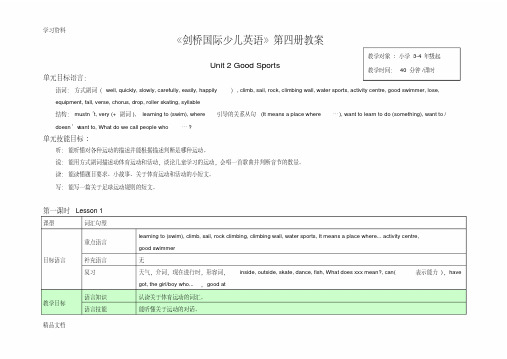
《剑桥国际少儿英语》第四册教案Unit 2 Good Sports单元目标语言:语词:方式副词(well, quickly, slowly, carefully, easily, happily), climb, sail, rock, climbing wall, water sports, activity centre, good swimmer, lose, equipment, fall, verse, chorus, drop, roller skating, syllable结构:mustn’t, very (+副词), learning to (swim), where引导的关系从句(It means a place where …), want to learn to do (something), want to / doesn’twant to, What do we call people who …?单元技能目标:听:能听懂对各种运动的描述并能根据描述判断是哪种运动。
说:能用方式副词描述动体育运动和活动,谈论儿童学习的运动,会唱一首歌曲并判断音节的数量。
读:能读懂题目要求、小故事、关于体育运动和活动的小短文。
写:能写一篇关于足球运动规则的短文。
第一课时Lesson 1课型词汇句型目标语言重点语言learning to (swim), climb, sail, rock climbing, climbing wall, water sports, It means a place where... activity centre,good swimmer补充语言无复习天气,介词,现在进行时,形容词,inside, outside, skate, dance, fish, What does xxx mean?, can(表示能力),have got, the girl/boy who...,good at教学目标语言知识认读关于体育运动的词汇。
pep小学英语四年级下册第二单元说课稿

Good afternoon,everyone!It’s my great pleasure to be here and share my lesson with you、The content of my lesson is PEP Primary English Book4 Unit2“What time is it?”First, let me talk about my teaching material、Part I Teaching material analysis、This lesson is the second part of unit2“Let’s talk”、In the first part,the Ss have learned the sentence“What time is it? It’s nine o’clock、 It’s time for English class、”So the Ss have mastered how to express the time ,like:It’s 6:00、It’s 8:35、 In this lesson,we will continue to learn how to express the time ,and the Ss are able to express“It’s time to do something”、Therefore ,on study the teaching material ,I put forward the teaching objectives 、1.knowledge objective:a)The Ss can hear, read, and use the main sentence:It’s ,,, o’clock、It’s time to,,,、It’s time for,,,、 b)The Ss can understand and read theconversation of the lesson、2、Ability objective:The Ss can not only inquiring “What time is it?”, but also can use the sentence patterns to describe the daily life of themselves、3、Emotion objective:By completing this lesson,to enhance the Ss’sense of cherishing time and to help them form a habit of living a regular life、And help the Ss build confidence in learning English、Next,the key points of this lesson:Study and use the sentence patterns to describe the daily life、Difficult points:Recognizing the difference of“It’s time to,,,”and“It’s time for,,,”、Besides,the Ss can understand the“oops”means a surprising sound、I’d like to usea chant to help them recognise the two sentence patterns、methods、I’ll talk about my teaching methods and learning strategies below、Part 2 Teaching Methods:In this lesson,I adopt the five-step Teaching Method and Task-based Language Teaching、These method offer the Ss an opportunity to complete the tasks in real life,the Ss can learn by doing ,learning by using、Part 3 Studying Methods:Let Ss study in a relaxed atmosphere、 Ss understand the new knowledge in certain degree through the process of hearing, saying, observing, thinking etc、 And make preparation for completing the new study task、Part4 Teaching AidsAs for teaching aids ,I will useblackboard ,type,record 、Besides,I will also use power- point documents and multimedia , it can promote the Ss’ enthusiasm and creativity in learning English、Part 5 Teaching Procedure:Step1,Warming upa)Greeting:Good afternoon,everyone!Do you know what time is it?It’s 15:55,It’s time for English class、There will be a greeting between the teacher and the Ss,the greeting is related with the time、So it can easily lead the Ss into the class、b)Sing a song: What time is it?So as to the psychological characteristics of children,singing a song can make Ss feel pleased and satisfied, and can lead the Ss into a English studying atmosphere、Step 2 Revisiona)use“TPR”,first,the teacher and the Ss reading the phrases while doing gestures ,then do the games “You do I guess”,one S perform,the other Ss guess what is it? These activities aims to help the Ss review the phrase they have learned、b)With the help of ppt ,let the Ss practice“What time is it?It’s,,,、”,When the Ss are familiar to express the time ,the teacher ask the Ss“Are youready?”leading:I’m ready!Step3 Presentationa)The teacher draw a clock at six o’clock in the blackboard ,and leading today’s topic“Mike’s daily life”、Then the teacher use the muti media to play two interesting dialogues to explain“oops”、b)Listen carefully and reading the test aftertype ,after that each two Ss do role playing、Step4 practicea)The teacher give the Ss a chant like part A Let’s do,to help them remember the expression of “It’s time to,,,and It’s time to,,,、It can also practice their listening skills and arise their interesting、Time for P、E,jump and run、Time for Chinese,read and write、Time to get up ,eat some bread、Time to go to school,meet my friends、b)pair workTwo Ss express the same meaning in different ways to practice the two pattern sentences 、Forexample ,A:It’s time for lunch 、B:It’s time to go to the canteen、Step 5 consolidationLet the Ss according to the same time speaking different activities that they can do、It’s 7:30、It’s time to go to school、It,s time to have breakfast、Step6 sump upIt’s timefor+breakfast/lunch/dinner/P,E/English class、、、It’s time to+go to school/get up(V phrases)Step7 homework1.Modeled on the picture in the book,describe your work and rest time to your friends、2.Make a report of cherishing time、Part6 Blackboard designThe left is、、、the middle is、、、the right is、、、Above is the lecture notes of my lesson、 Thank you!。
凤凰职教book4Unit2教案
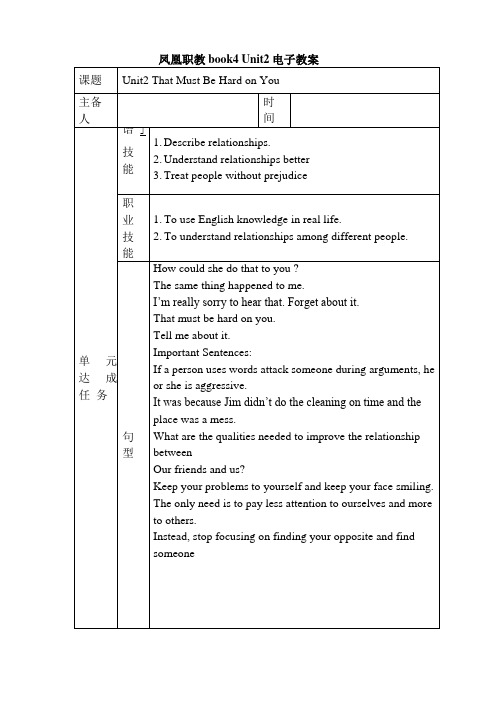
凤凰职教book4 Unit2电子教案Take students to read the picute of Parti and guesswhat’s happening to Jim.Listen to the conversation and circle what Jim is upset about.Then correct the answer.Listen again and complete the Part2 True or False.And tell the reasons to the class.Try to encourage to complete the part3 by themselves by using theinformation they have got in the before Twice’s listening.教学反思Stepl RevisionHave a dictaionSome important words: aggressive, gentle,patient,amazing, fun, bossy .....Students can describe their partners by the words we have learned last class.Step2 ListeningFirst listening:Take students to learn the three sentences and to know their chinese meanings.Listen to the tape recorder and find out the problem mentioned in each item.(Tell students to catch the key information when they are listening and take some notes.)Second Listening:Read the five sentences and try to complete the conversations with them.Ask two students to practise the conversations .Listen again and check their answers.some useful phrases:talk behind my back, all sorts of lies, ask him for help. Step3 Conversation StrategUnderstandingGenuine compassionMake you be in a similar situationBe a good listenerStep4. Work with a partner. Role-play the following e the conversation strategy in Acivity5. Situation 1: ......Situation 2: ......Situation 3: ......教学反思Ask some students to read the passageA one by one.Students can express that how to be friendly and charming by their own words. Complete the exercise 2 and check the answers with others.Step3 DiscussionWhat else can be done to improve friendships?Divide the students into several groups and talk with each other.教学反思different from themselves is a great relationship match. Be different from 与。
Book4 Module1 unit2 dialogue教学设计

能掌握课文单词短句句型,能背熟和表演本课对话,学会祝福别人,懂得尊重长辈。能描述生日会上正在进行的动作
Emphasis, Difficulties Analysis And Teaching Preview
板书并操练:forget/forgetting/forget something
编故事情景,事先找好一位学生T:Today iss birthday!Lets sing a birthday song.These are from me-a birthday card,a new computer game,Happy Birthday to you!板书并操练:happy birthday! Computer game
介绍学生自己生日会上的食物与参与的人员
Teaching Procedures
教学过程
1,《英语活动手册》U2 EX4,5
2,听读背U2课文及单词
Reflection or Notes
教学反思、随笔
课型
新授课
Objectives:
教学目标
教学资源
多媒体, 图片等
Preparation For Lessons
相关前置性学习
Period
课时
1
Type of lesson
重难点分析与教学预设:
本课的单词,短语与课文的学习
Teaching Resource
Book4 Module1 unit2 dialogue教学设计
Team
备课年级组
四年级
Designer
执笔
李维芬
Module
/Topic
二年级上册英语说课稿-module 4 unit 2 he doesn't like these t
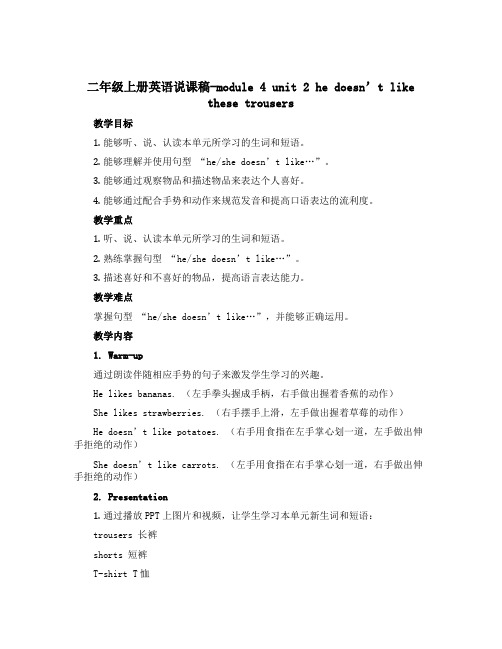
二年级上册英语说课稿-module 4 unit 2 he doesn’t likethese trousers教学目标1.能够听、说、认读本单元所学习的生词和短语。
2.能够理解并使用句型“he/she doesn’t like…”。
3.能够通过观察物品和描述物品来表达个人喜好。
4.能够通过配合手势和动作来规范发音和提高口语表达的流利度。
教学重点1.听、说、认读本单元所学习的生词和短语。
2.熟练掌握句型“he/she doesn’t like…”。
3.描述喜好和不喜好的物品,提高语言表达能力。
教学难点掌握句型“he/she doesn’t like…”,并能够正确运用。
教学内容1. Warm-up通过朗读伴随相应手势的句子来激发学生学习的兴趣。
He likes bananas. (左手拳头握成手柄,右手做出握着香蕉的动作)She likes strawberries. (右手摆手上滑,左手做出握着草莓的动作)He doesn’t like potatoes. (右手用食指在左手掌心划一道,左手做出伸手拒绝的动作)She doesn’t like carrots. (左手用食指在右手掌心划一道,右手做出伸手拒绝的动作)2. Presentation1.通过播放PPT上图片和视频,让学生学习本单元新生词和短语:trousers 长裤shorts 短裤T-shirt T恤jumpers 毛衣socks 袜子2.通过展示PPT上的句型,让学生通过模仿和造句来掌握句型:He doesn’t like these trousers. (指着图片上的长裤)She doesn’t like those shorts. (指着图片上的短裤)3. Practice1.通过猜谜语来巩固所学内容。
What is it? It’s long and you wear it on your legs. (trousers)What is it? It’s short and you wear it in summer. (shorts)What is it? It’s a piece of clothing. It has sleeves and you wear it on the top half of your body. (T-shirt)2.通过分组让学生展示自己所喜欢和不喜欢的物品,运用句型表达。
Book4unit2Extendedreading课件ppt
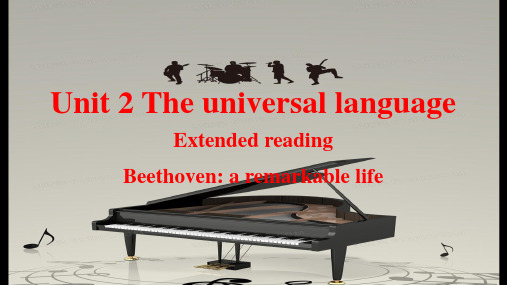
studying music day and night
enjoying a reputation as a wonderful young musician
Reading
Para. 3
Please discuss the second question in partA with your partners.
Lead-in
• 1. What kind of disability did Beethoven suffer from? • 2. Did he give in to fate? How did he overcome that
disability? • 3. Why is he “remarkable”?
Unit 2 The universal language
Extended reading Beethoven: a remarkable life
Lead-in
What do they have in common? Despite their physical disabilities, they achieve success with great determination.
What qualities lead to Beethoven’s great success?
Qualities of Beethoven
determinatio
optimism n
desire
diligence
Qualities of Beethoven
talent
creativity
passion
Part 2 Paras. 2–3
9
Beethoven’s life journey before his latetw(2e)nties Beethoven’s attitudes in the face oft(h3e)loss of hearing
剑桥国际少儿英语book4-Unit2-课件-

18
Practice—P17--#6
Pair work — Say and guess
19
Practice
Activity Book—P17 Unit1-Test A and B listening
20
Nov 9.18
38
Practice—P21—Lock Key Before listening
Where did the story happen?
After 1st listening What does the note say? Why does the coach shout? What is Mr.Sweep doing?
24
Presentation
P18--#7,8.9 • badly adv.差地 • well adv.厉害地 • carefully adv.仔细地 • quickly adv.快速地 • slowly adv.慢地 • loudly adv.大声地 • quietly adv.安静地
25
Presentation
剑桥国际少儿英语book4-Unit2 课件
Oct12,18
2
Warm Up
Who is the king of the forest? Who knows more words?
3
Review
Unit1—Lock and Key Unit1-Activity book Oral homework checking
21
Warm Up
1.Unit1-Test A and B讲解 3.listening practice
必修4Unit2教案:阅读策略指导

必修4 Unit 2教案:阅读策略指导英语阅读是学习英语的重要组成部分,而阅读能力的提高又需要阅读策略的指导。
Unit 2的教学内容涵盖许多丰富的阅读材料,不仅可以帮助学生丰富知识,提高英语水平,还可以帮助学生学习和理解不同类型文本的阅读策略,从而提高自己的阅读能力。
本文将从教师和学生两方面探讨必修4 Unit 2教案的阅读策略指导。
一、教师角度作为学生的引领者,英语教师要善于运用各种阅读策略指导学生进行英语阅读,培养学生的阅读能力。
在Unit 2的教学中,教师应关注以下几个方面:1.了解不同类型阅读材料的阅读策略在Unit 2的教学中,有包括新闻报道、科技文章、历史文章、文学作品等多种类型的阅读材料。
教师需要了解并熟悉不同类型阅读材料的特点,从而针对性地指导学生选择和运用不同的阅读策略。
2.深入分析文章,传授阅读技巧教师在引导学生进行阅读时,可以有意识地帮助学生深入分析文章,全面了解其中的内容和结构,并传授相关的阅读技巧,如预测、扫读、略读、细读等,让学生在阅读过程中更加得心应手。
3.培养不同阅读策略的组合使用英语阅读策略的运用并不是孤立的,教师需要引导学生掌握并合理运用不同的阅读策略。
例如,学生在进行细读时,可以结合预测和扫读等技巧,更好地把握文章的重点。
二、学生角度英语阅读能力的提高关键在于阅读策略的运用,因此学生需要认真学习和掌握各种阅读策略,课堂时间内的指导是为学生后续的阅读打下基础。
学生在进行英语阅读时,可以从以下几个方面入手:1.明确阅读目的,合理安排时间在进行阅读时,学生首先需要明确阅读目的,从而合理安排时间。
如果目的是快速浏览整篇文章,那么可以运用扫读技巧;如果目的是查找某一特定信息,那么可以运用略读技巧;如果目的是全面理解和掌握文章,那么可以进行细读。
2.发现关键词和主旨句在阅读文章时,学生需要及时发现关键词和主旨句,并根据关键词和主旨句来理解文章中的内容。
这样能帮助学生更好地理解文本,把握文章的核心内容。
- 1、下载文档前请自行甄别文档内容的完整性,平台不提供额外的编辑、内容补充、找答案等附加服务。
- 2、"仅部分预览"的文档,不可在线预览部分如存在完整性等问题,可反馈申请退款(可完整预览的文档不适用该条件!)。
- 3、如文档侵犯您的权益,请联系客服反馈,我们会尽快为您处理(人工客服工作时间:9:00-18:30)。
Unit 2 Period 3 Chemical or Organic farming
说课稿
固阳县第一中学
乔佳
2016.9.22
各位评委老师,上午好,今天我说课的内容是高中英语必修4
Unit 2 第三课时Using Language Chemical or Organic farming
我说课内容包括以下几个部分:教材分析、学情分析、说教法学法、教学程序及教学反思。
首先我们来进行教材分析。
一.教材分析
本课为人教课标版必修4 Unit2 Working the land. Using language:Chemical or Organic farming 。
本单元的中心话题是“农业”,本课是该单元的第二篇阅读课。
学生通过讨论和阅读了解有关化肥危害和有机耕作的知识,并运用这些知识倡导学生关注有机农业,注重健康。
二.学情分析
高中二年级学生,智力发展趋于成熟。
他们的认知能力比初中阶段有了进一步的发展,渐渐形成用英语获取信息、处理信息、分析问题和解决问题的能力。
他们学习英语方法由死记硬背转型向理解型并应用到交际上,他们有自己的学习技能和策略,学会把语言学习与现实生活和兴趣联系起来。
通过任务型课堂活动和学习,学生的学习自主性得到加强,不再认为英语的课堂学习很枯燥,主动参与到活动中去,成为课堂的主体,同时也加强了与他人交流合作的能力。
他们会对课文内容提出自己的疑惑和勇于阐述见解,并且从课内知识拓展到课外,通过多种渠道获取学习资源。
不过,学生的水平参差不齐,有些差距还相当大。
因此在教学过程中,布置的任务要兼顾各个层次的学生,使他们都有所收获。
三.教学目标分析
根据新颁布的《普通高中英语课程标准(实验稿)》关于阅读课主要教学目标的具体描述,结合本课教学内容,具体从语言知识、语言技能、情感态度和文化意识三个方面制定如下教学目标。
1. 语言知识目标:
a) 使学了解农业耕种的相关词汇,并掌握相关的表达法。
b)学习动词的---ing 形式作主语的句型。
c)学生通过学习理解什么是化学农业,什么是有机农业,以及掌握有机农业的优点等信息
2. 语言技能目标:
a)阅读技能的训练:让学生学会克服生词障碍,通过略读,归纳出段落大意;通过细读,理清文章的总体框架与脉络,归纳出各部分的中心词,培养学生获取、处理信息的能力。
b)让学生运用本节课所学知识,结构,以“Plastic or Cloth bags?”为题模仿这篇文章的篇章结构和句子结构去写一篇说明文。
提高学生英语应用能力。
3.情感态度与文化意识目标:
a)学生要运用所学知识倡导人们关注有机农业,注重健康。
培养学生爱学英语、爱说英语、想说英语,并对英语学习投以极大的兴趣和热情。
d)培养学生的合作意识和“合作学习”的习惯。
e)欣赏课文中优美句子,了解一些英语修辞手法,使学生在学习完课文之后得到一次美的享受,一次心灵的愉悦和升华。
四.教学重点与难点分析
1.教学重点
1)指导学生掌握文章的主要信息,并能通过学习熟练运用难以理解的词、句型和句子。
2)掌握对待阅读课的一些技巧和方法。
2教学难点
通过阅读学习,学生根据实际情境需要真正开口讲英语。
五.教法分析
结合文章具体内容及学生的差异性,确定本节课主要采用任务型语言教学法(Task-based Language Teaching) 、合作学习教学法(Cooperative Learning Approach)、整体语言教学法(Whole Language Teaching)、直观教学法、交际教学法(Communicative Approach)、以及情感激励教学法(Affective Motivation)等教学方法。
六.学法分析
1)认知策略:指导学生运用已学会的抓重点、做记号、摘笔记等方式,对所学内容进行整理与归纳。
2)调控策略:培养自我评价与相互评价的习惯,鼓励学生增加与教师和同学交流学习英语的体会和经验,学会科学评价自己的学习行为与学习效果,进一步形成有效的学习方法,树立积极向上的学习态度。
3)交际策略:创设有意义的情景和任务活动,引导学生通过四人小组进行合作学习,让他们围绕课堂任务分工合作,相互探讨、相互交流,从而获得知识、技能和情感体验,变被动学习为主动学习。
七.教学过程
第一步:导入话题。
(Lead in)
开头通过学生熟悉的开心农场游戏的步骤导入有机农业和化学农业。
第二步跟读与限时阅读完成导学案练习
贯彻目的与困难策略,指导学生根据不同的阅读目的,在阅读的不同阶段,灵活使用各种阅读策略,捕捉文章主要信息,理解作者的写作意图,突破本文的教学重点与难点。
采用整体语言教学法和任务型语言教学法。
1、通过限时阅读训练,引导学生如何利用略读(skimming)的方法把握段落的大意,侧重培养快速阅读理解能力和文章中心把握能力。
2、精读各个段落语段,侧重培养快速捕捉文章重要细节的能力和猜测生词的能力,学会欣赏文章中的优美句子。
第三步小组活动,组内解决词汇,短语以及长难句的分析,培养学生合作精神。
第四部,展示环节,让学生讲难句,培养他们分析问题,解决问题的能力。
其次,以高考题型,语法填空来考查评价。
最后,以“Plastic or Cloth bags?”为题模仿这篇文章的篇章结构和句子结构去写一篇说明文。
来培养学生的语言应用能力。
五、教学反思
要保证高效课堂的有效构建,应该从课前,课中,课后出发,发展自主学习和合作学习的能力。
把课堂英语教学与学生实际生活结合起来,有助于学生共享生活经验,解决生活中的一些实际问题。
